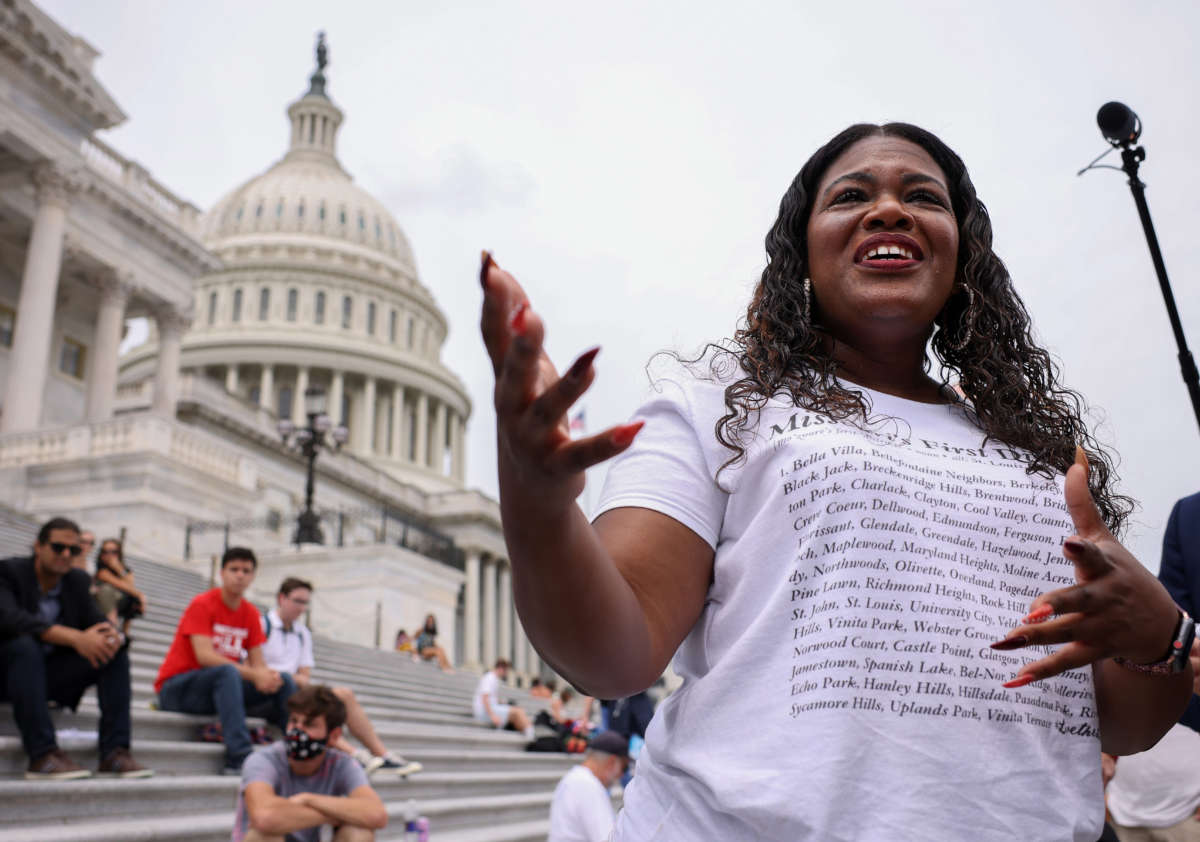Honest, paywall-free news is rare. Please support our boldly independent journalism with a donation of any size.
Rep. Cori Bush (D-Missouri) has said that Black people aren’t being given an equal voice in Washington when it comes to major proposals like the infrastructure and reconciliation bills, noting that those who continually get a seat at the table aren’t necessarily representing Black constituents’ interests.
Bush, who represents a district with a 49 percent Black population, said to CNN’s Ryan Nobles in a short interview: “Who’s at the table? I would love to see somebody who represents a predominantly Black district be at the table. I would love to see someone who represents more diversity at the table. I would love to see more Black women at the table.”
As Congress and the White House are caught in near-deadlocked negotiations over the Democrats’ reconciliation bill, major decisions are coming down to the whims of conservative Democrats like Sen. Kyrsten Sinema (D-Arizona) and Sen. Joe Manchin (D-West Virginia) in the Senate and people like Rep. Josh Gottheimer (D-New Jersey) in the House. All of these lawmakers are white.
“When I look at who is representing us, when I think about how often Kyrsten Sinema gets to go to the table, to the White House, and she does not represent the communities that I represent — can she speak and advocate? Absolutely. But she’s not doing that,” Bush said. “It has to be people over property. It has to be people over corporations. And that’s not what we have right now, and so I’m absolutely, absolutely disgusted.”
As a representative from 2013 to 2019, Sinema represented Arizona’s 9th district, which is 55 percent white, 27 percent Latinx and seven percent Black. These demographics reflect Arizona’s population at large, which is 54 percent white.
However, as Bush pointed out, it’s not just about the communities these lawmakers represent, but how they represent them. Sinema has demonstrated a flippancy toward what her constituents think of her, and advocates in her state say that she has made it difficult for constituents to contact her. When debate over filibuster reform or abolition reached a fever pitch this summer, progressives noted that 61 percent of people in Arizona would prefer action in Congress over the filibuster, but Sinema held steadfast to her devotion to the archaic practice.
It seems that Sinema pays no mind to her party back home as well. The Arizona Democratic Party State Committee has warned the senator that it will hold a vote of no confidence if she continues obstructing the Democratic agenda, which could mean that she would lose the support of her own state’s Democrats when she is up for election in 2024.
Instead, Sinema appears to be beholden to one group above all others: deep-pocketed corporate lobbyists. On Tuesday, she held a fundraiser with business groups that are all fiercely opposed to her own party’s agenda. That same day, she met with President Joe Biden. The details of the meeting haven’t been made public, but she has been insistent that the Democrats’ Build Back Better Act must be pared down, and that she will not accept tax raises that partially undo Republicans’ 2017 tax cuts for corporations and the wealthy.
It’s a similar story for Manchin, who is continually given a powerful role in negotiations despite standing for different values than much of the Democratic caucus. Manchin’s home state is a staggering 92 percent white. But in deep red parts of West Virginia, voters understand the importance of provisions in the Build Back Better Act like the child tax credit extension, Medicare expansion and a plethora of other proposals to expand the social safety net.
Manchin claims to support bipartisanship — but bills like the reconciliation package that he wants to cut are bipartisan, garnering support from both Democratic and Republican voters in his state. Further, the vast majority of Democratic voters don’t want to cut items from the reconciliation bill, so he has no reason to break with people loyal to his own party.
Trump is silencing political dissent. We appeal for your support.
Progressive nonprofits are the latest target caught in Trump’s crosshairs. With the aim of eliminating political opposition, Trump and his sycophants are working to curb government funding, constrain private foundations, and even cut tax-exempt status from organizations he dislikes.
We’re concerned, because Truthout is not immune to such bad-faith attacks.
We can only resist Trump’s attacks by cultivating a strong base of support. The right-wing mediasphere is funded comfortably by billionaire owners and venture capitalist philanthropists. At Truthout, we have you.
Truthout has launched a fundraiser, and we have only 24 hours left to raise $15,000. Please take a meaningful action in the fight against authoritarianism: make a one-time or monthly donation to Truthout. If you have the means, please dig deep.
